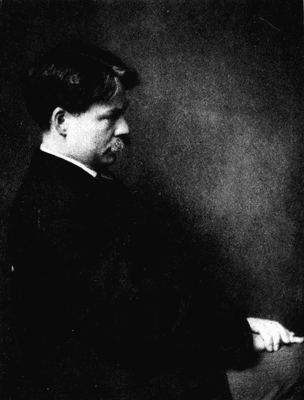Transcriber's Notes
Printer errors have been corrected.
Full-page illustrations have been moved so as not to interrupt theflow of the text; some page numbers are skipped as a result.
Midi files have been provided for all music illustrations exceptautographs and the handwritten manuscript score of Salammbô. Click on the [Listen] link to hear the music. Lyrics withinthe music illustrations have been transcribed and placed below thenotation image.
Contemporary
American Composers
BEING A STUDY OF THE MUSIC OF THISCOUNTRY, ITS PRESENT CONDITIONS AND ITSFUTURE, WITH CRITICAL ESTIMATES ANDBIOGRAPHIES OF THE PRINCIPAL LIVINGCOMPOSERS; AND AN ABUNDANCE OF PORTRAITS,FAC-SIMILE MUSICAL AUTOGRAPHS,AND COMPOSITIONS
By
Rupert Hughes, M.A.
Contents
List of Music
List of Illustrations
ILLUSTRATED

Boston
L.C. Page and Company
(Incorporated)
1900
Copyright, 1900
By L.C. Page & Company
(INCORPORATED)
All rights reserved
Colonial Press
Electrotyped and Printed by C.H. Simonds & Co.
Boston, U.S.A.
Edward MacDowell.
TO
James Huneker
MUSICIAN TO THE TIP OF HIS PEN
FOREWORD.
One day there came into Robert Schumann's ken the work of a young fellownamed Brahms, and the master cried aloud in the wilderness, "Behold, thenew Messiah of music!" Many have refused to accept Brahms at thisrating, and I confess to being one of the unregenerate, but the spiritthat kept Schumann's heart open to the appeal of any stranger, that ledhim into instant enthusiasms of which he was neither afraid nor ashamed,enthusiasms in which the whole world has generally followed hisleading—that spirit it is that proves his true musicianship, and makeshim a place forever among the great critics of music,—a small, smallcrowd they are, too.
It is inevitable that a pioneer like Schuviiimann should make manymistakes, but he escaped the one great fatal mistake of those who arenot open to conviction, nor alert for new beauty and fresh truth, whoare willing to take art to their affections or respect only when it haslost its bloom and has been duly appraised and ticketed by othergenerations or foreign scholars. And yet, even worse than thislanguorous inanition is the active policy of those who despiseeverything contemporary or native, and substitute sciolism forcatholicity, contempt for analysis.
While the greater part of the world has stayed aloof, the problem of anational American music has been solving itself. Aside from occasionalattentions evoked by chance performances, it may be said in general thatthe g
